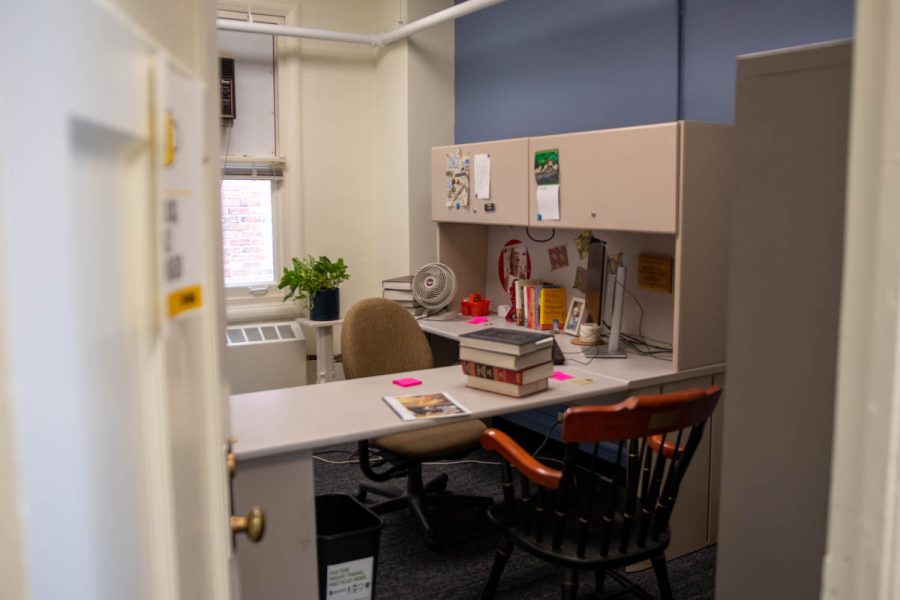UI Center for Human Rights, Legal Clinics helps offer immigration legal services to Afghan immigrants
Resources offered through the collaboration will be direct representation, pro se clinics, and a Virtual Help Desk.
The University of Iowa Center for Human Rights office is seen in the Jefferson Building in Iowa City on Oct. 14, 2022
October 18, 2022
Soon after an influx of Afghan evacuees arrived in the U.S. in August 2021, the University of Iowa Center for Human Rights started working with the UI College of Law Legal Clinic to assist in legal service provision.
The program, ALL Iowa Afghan Legal League of Iowa, aims to address gaps in Iowa infrastructure surrounding immigration legal access. The program brings experts from the UI, Drake University’s Legal Clinics, and the Iowa Migrant Movement for Justice.
In August 2021, approximately 76,000 Afghans were airlifted from Afghanistan following the governmental takeover by the Taliban. The Iowa Department of Health and Human Services allocated $1.1 million over two years to the collaboration in response to more than 900 Afghans resettling in Iowa by April 2022.
UI Center for Human Rights Assistant Director Amy Weismann said she helps facilitate communication between the groups and create a statewide network for immigration services.
“There are a lot of people in the state who are already providing legal services and other kinds of services, other kinds of support to Afghans who come to Iowa,” Weismann said. “We’re hoping that through this arrangement, we can help to elevate and expand those services.”
The UI is offering refugee legal training and is representing some Afghans in their immigration cases.
Weismann said she hopes UI community members will get involved, especially those with proficiency in Dari and Pashto, languages spoken by Afghans.
“We’re working with law students here at the University of Iowa, but also at Drake, to develop what we’re calling a refugee legal core to help train law students with an interest in this area of law, and then place them with some stipends in organizations around the state to build the capacity of those organizations to provide the kind of help that Afghans need,” Weismann said.
Drake University Refugee Clinic Co-Director Suzan Pritchett said the university is providing services for asylum help including training non-immigration pro bono attorneys and offering pro se clinics.
“We’re providing ongoing mentoring and supervision to those pro bono attorneys who have an actual Afghan client they’re representing through the entire process of helping that person apply for asylum,” Pritchett said.
Applying for asylum includes filing paperwork with the government and interviewing with a U.S. Federal Asylum Officer, Pritchett said. Drake University is also creating a Virtual Help Desk for Afghan evacuees designed to answer questions about the immigration process.
“Both students in the Drake Legal Clinic and a student at the University of Iowa’s immigration clinic are reaching out to community groups, stakeholders, Afghan community members, and asking them sort of the universe of information we feel like we need to be able to move on to designing this help desk,” Pritchett said.
RELATED: Sponsor circles help facilitate Afghan refugee resettlement in Iowa
Iowa Migrant Movement for Justice co-legal Director Ann Naffier said Afghan evacuees are currently “without refugee status” and are on two years of temporary parole in the U.S. Many Afghans are told to apply for temporary protected status or get a work permit, she said.
“It’s not a promise of a green card but at least would be a way for those folks who came on parole and don’t have any other program available to them right now,” Naffier said.
While allowing for legal status, Temporary Protected Status does not allow Afghan evacuees to bring over family members because sponsorship of family members is reserved for those with permanent legal immigration status.
Naffier said many of the evacuees said they thought getting to the airport and onto a plane would have been too dangerous for spouses and children.
“They left them behind, thinking that they would be able to quickly bring them over and they would be able to rejoin them in safety here in the United States, and that has not happened at all,” Naffier said.















